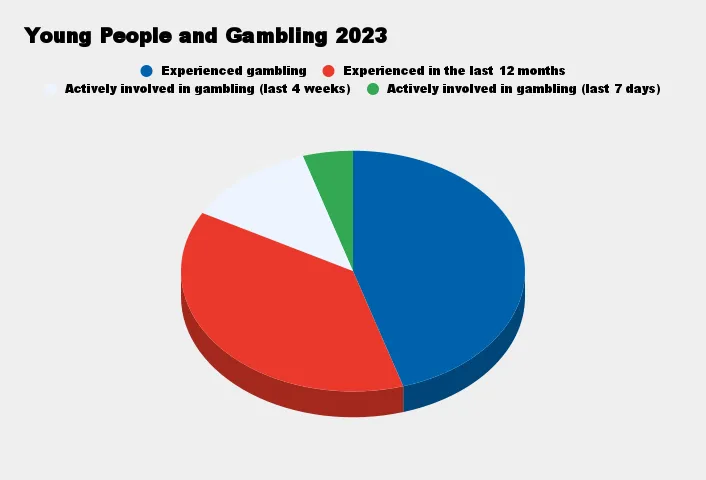The Young People and Gambling 2023 report is a research study conducted by Ipsos on behalf of the UK Gambling Commission published at November 16, 2023. The report aims to provide an insight into the gambling behaviour, attitudes and awareness of young people aged 11 to 16 in Great Britain. The report is based on a survey of 2,000 young people, as well as qualitative interviews with 20 young people and 10 parents. The report covers various topics, such as the prevalence and frequency of gambling, the impact of gambling on young people, the online gambling behaviour, the National Lottery play, the games and gaming machines play, the context for gambling participation, and the attitudes towards and exposure to gambling.
The main findings of the report are:

The most common forms of gambling among young people are:
- arcade gaming machines (30%),
- private bets with friends or family (24%),
- and scratchcards (23%).
The most common forms of online gambling are :
- loot boxes (11%),
- in-game items (10%),
- and skins betting (9%).
The majority of young people (82%) think that gambling is dangerous and only 7% think that it is a good way to make money. However, 17% of young people have been influenced by gambling advertising or sponsorship, and 15% have been encouraged by someone else to gamble.
The impact of gambling on young people is mixed. Some young people (14%) have experienced positive outcomes, such as enjoyment, excitement, and socialisation. However, some young people (11%) have experienced negative outcomes, such as losing money, feeling guilty, or having arguments. Some young people (4%) have also shown signs of problem gambling, such as lying, chasing losses, or borrowing money.
The online gambling behaviour of young people is influenced by various factors, such as the availability and accessibility of online platforms, the appeal and convenience of online games, the social and peer pressure, and the lack of awareness and regulation. Some young people (19%) have used their parents’ or someone else’s account to gamble online, and some young people (12%) have been asked for their personal details or money by someone they met online while gambling.
The National Lottery play of young people is relatively low, with only 8% of young people having played the National Lottery draw-based games and 7% having played the National Lottery scratchcards in the last 12 months. The main reasons for playing the National Lottery are the chance of winning a large amount of money, the fun and excitement, and the ease and convenience.
The games and gaming machines play of young people is relatively high, with:
- 30% of young people having played arcade gaming machines,
- 18% having played fruit machines,
- and 17% having played claw machines in the last 12 months.
The main reasons for playing games and gaming machines are the enjoyment, entertainment, and challenge, the social and peer interaction, and the chance of winning prizes or money.
The context for gambling participation of young people is influenced by various factors, such as the personal and family circumstances, the school and community environment, the hobbies and interests, and the media and technology. Some young people (18%) have received gambling education or information at school, and some young people (16%) have talked to their parents or carers about gambling.
The report concludes that gambling is a complex and multifaceted phenomenon that affects young people in different ways. The report recommends that more efforts are needed to raise awareness and provide support for young people who are at risk of gambling-related harm, as well as to prevent and reduce the negative impacts of gambling on young people. The report also suggests that further research is needed to explore the emerging trends and issues in the online gambling behaviour of young people, as well as to evaluate the effectiveness of the existing interventions and initiatives.
Related Resources:
- Youth Programme – Educational programme provided by GamCare.
- YGAM – Award-winning charity that works to prevent gaming and gambling harms among young people through awareness raising, education and research.
